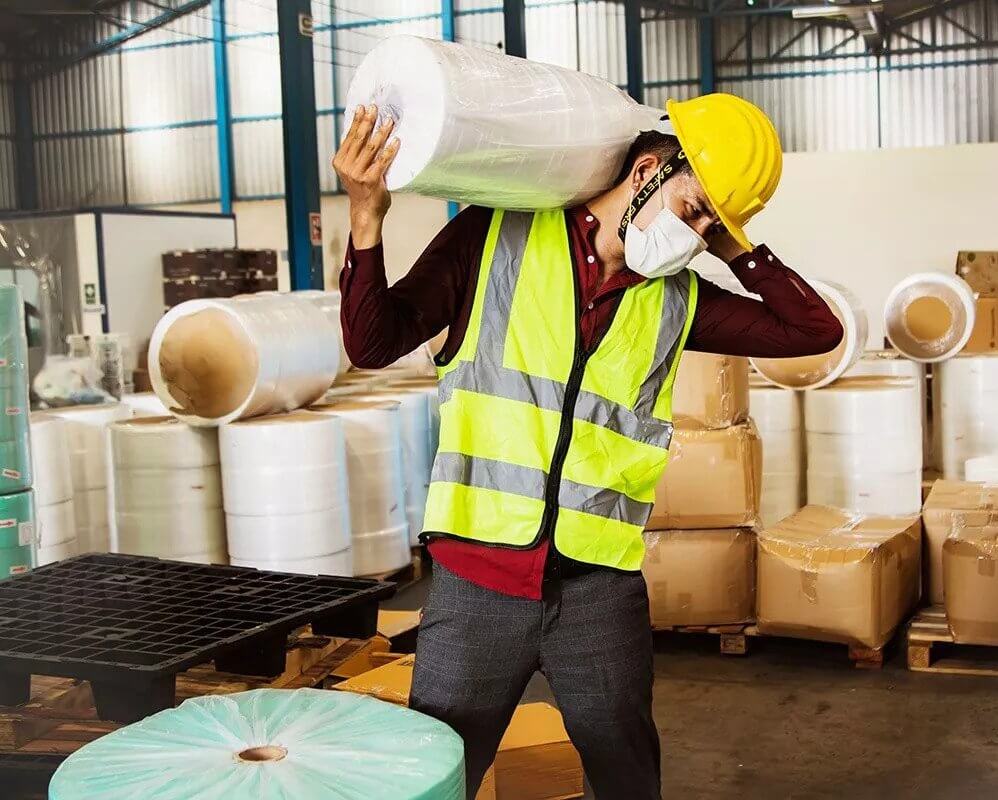Manual Handling Compensation Claims
‘Manual handling’ is a term given to moving loads, including some techniques such as lifting, putting items down, pushing, pulling or carrying. When this type of work isn’t carried out correctly injuries can occur, sometimes leading to long term damage.
Injuries caused by heavy-lifting and manual handling are some of the most common workplace injuries – accounting for one-third, according to the Health and Safety Executive.
We offer free initial advice for handling work accident claims. When it comes to take on accident at work cases, we can offer a No Win, No Fee service. This means you don’t have to pay us anything if we won’t be able to secure compensation for you.
What are the regulations for manual handling?
Many different jobs involve manual handling tasks that could potentially cause injury at work. Therefore, adequate measures should be put in place to reduce the risks of employees and workers being injured at work. Under the Manual Handling Operations Regulations 1992 (MHOR), employers must assess all manual handling risks and minimise them. This is broken down into three key responsibilities:
- To avoid hazardous manual handling wherever possible;
- To risk assess any unavoidable manual handling;
- To reduce the risk of injury, for example, with equipment.
If you feel that your employer has not met these obligations, and you have suffered an manual handling injury at work, you can give us a call or request a free callback. We will assess your case and see if you can make a manual handling injury compensation claim.
What are manual handling injuries?
The most common types of manual handling injuries at work are sprains and strains. These injuries usually results in short or long-term pain, all of which we will consider when settling your potential manual handling compensation claim.
You may even have a injury or medical condition that was made worse by manual handling injury. Here are some other examples of injuries caused by poor manual handling:
- Breaks and fractures;
- Hernia (organ displacement/protrusion due to strain);
- Injuries to the upper and lower limb muscles;
- Internal injuries;
- Back and neck problems.
Some workplaces may have higher risks than others, such as warehouses and construction sites. As such, employers must comply with the Manual Handling Operations 1992 guidelines. If you’ve suffered a manual handling injury caused by employer negligence, we can help you to make a compensation claim.
The most common manual handling compensation claims occur in the following workplaces:
- Warehouses and factories – for example, if employees have had to push, pull or lift heavy loads without equipment;
- Building and construction sites – for example, injuries while moving heavy equipment such as drills, mixers, or everyday items you use in your job such as sacks of cement, bricks and pallets;
- Care homes – for example, if carer help move patients to different places, which can cause back strain and injuries.
Looking for some help?


How are manual handling injuries caused?
Manual handling of loads may cause a strain to your body through continuous lifting/handling activities. Injuries caused by manual handling are classed as musculoskeletal disorders (MSDs), a term which covers any injury, damage or disorder which causes harm to the joints or the tissue in your limbs or back. MSDs account for more than a third of all work-related injuries (statistics include MSDs caused by manual handling) and can cause excruciating pain. Manual handling injuries can be caused by:
- Loads being too heavy;
- Loads being too large;
- Loads being difficult to grasp or becoming unstable;
- Tasks being too strenuous;
- Tasks involving awkward postures or movements;
- Work environments lacking sufficient space.
Looking for some help?
What are employer’s responsibility to reduce manual handling injuries?
Your employer has a duty to reduce the risk of manual handling injuries occurring whilst at work. They need to make sure that the correct training and equipment is provided to allow you to do your job safely. When manual handling work isn’t carried out correctly it can cause serious injury. Your employer has done the following as minimum:
- Provided you with adequate training on how to lift, carry, pull or push items;
- Carried out manual handling risk assessments at work;
- Should have taken steps to ensure that manual handling tasks are only completed if absolutely necessary and unavoidable;
- Considered the work environment to determine whether it is suitable for manual handling to be carried out;
- Organised manual handling tasks in a safe way, with loads, split appropriately and suitable rest periods being provided.
Why You Need Legal Representation: The Role of a Solicitor in Your Claim
Seeking legal representation from a knowledgeable and experienced solicitor specializing in workplace injuries is essential to protect your rights and maximize your compensation. A skilled solicitor can assess the circumstances surrounding your work accident injury, gather evidence to support your claim, and negotiate with insurance companies on your behalf. They can also guide you through the legal process, ensuring that deadlines are met, and your rights are upheld every step of the way.
A solicitor specializing in workplace injuries can be a tremendous asset. They can help in:
-Assessing the validity of your claim.
-Gathering necessary evidence and documentation.
-Negotiating with insurance companies.
-Representing you in court, if necessary.
How much will it cost to make a work accident claim?
(No Win, No Fee)
We will take on your work accident claim on a ‘No win, No fee’ basis. Our charges to you are dependent upon the individual type of case, and are typically a percentage of the compensation amount that we obtain for you. Where we offer “No Win, No Fee” services, typically customers pay 25% plus VAT of the companestion amount we able to recover on your behalf and any ir-recoverable disbursements. If we won’t able to secure any compensation for you then you don’t have to pay us anything.
If you or someone you know has sustain cuts, laceration or scarring injury then feel free to contact us. Alternatively, you can also request a free, no obligation callback request from our website.
How long do you have to make an accident at work claim?
Work accidents can cause serious injuries. This is because most working environments have a high accident potential when not maintained – or if staff haven’t been trained properly. You typically have three years from the date of the accident or diagnosis of a medical condition to make an injury at work claim. However, there are some exceptions to this rule:
- Psychological Trauma or Mental Capacity – if you or your loved one no longer has the mental capacity to make a claim themselves (often the case following a traumatic brain injury), then in these circumstances there is no time limit for making a compensation claim.
- Accidents While Working Abroad – if your accident happened while working abroad, the time limit for making a claim may be shorter.
- Defective Work Equipment – if your injury was caused by a piece of equipment that had a manufacturing defect, the time limit may be different. If you’ve been injured with an accident at work it’s best to contact us as soon as possible, to ensure we can begin your claim within the relevant time limits.
- Under 18s – If you or a loved one suffered an injury at work when they were under 18 (including if the injury happened while in full or part time employment, as an apprentice or on work experience), a claim can be started at any point up until their 21st birthday. However, in cases where mental capacity has been lost, then no time limit applies.
What do i need to prove in an accident at work claim?
If you’ve been injured at work in the last three years and it wasn’t your fault, you may be able to claim compensation. Injuries, medical condition and work-related illnesses are often caused by employers and managers failing to follow proper health and safety rules.
First, you need to prove that the accident that caused your injury (or medical condition) was not your fault. Second, the evidence must demonstrate that the accident was caused by the negligent action – or inaction – of your employer.
You can call us or request a free callback and we will assess your accident at work claim.
Am I Eligible To Make An Accident At Work Claim?
In the UK, employers and business owners are legally responsible for the welfare and safety of their staff and any visitors to their premises. The law states that all businesses must compulsorily hold employer liability insurance and conform to Health & Safety regulations to ensure that they meet those requirements/guidelines.
If your employer failed to meet their responsibilities and their negligence has caused injury (or medical condition), you can claim compensation by filing an accident at work claim. If your claim for a workplace injury is successful the compensation would be paid from the employers liability insurance. In certain circumstances, even if you contributed to your own accident at work, you may still be able to claim injury compensation if your employer is deemed to have been the main instigator of your personal injury or medical condition at work.
You can call us or request a free callback if you have any questions about claiming compensation for an accident at work.
Frequently Asked Questions (FAQs)
We are here to help!
If you, a friend or a family member has involved in an accident at work that caused your injury (or medical condition) then it may be possible to claim compensation for injuries or medical condition.
Our dedicated workplace accident solicitors will work hard to get you the compensation you deserve. Your settlement can help pay for private medical care and any time you’ve had to take off work.
You have three years to make an accident at work claim from the date you were injured.


